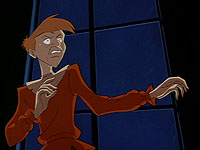 |
Jonathan Crane: Afraid of His Own Shadow
by Scott Summers
 According to FDR, “the only thing we have to fear is fear itself,” but according to Dr. Jonathan Crane, we also ought to cower at the sight of a five-foot-three, carrot-topped clinical psychologist who’s got a plainly visible nose the size of a cucumber (when he hasn’t got a bag over his head). No, there’s nothing less scary than someone constantly, day in and day out, trying to scare you—especially when his motives are an open book to anyone who’s seen more than ten minutes of TV featuring a criminal profiler. We envision his history: a scrawny kid, lacking a strong male role model, gets pushed around so often by the neighborhood bullies that he acquires a preference for experiencing other people’s fears rather than his own. Freud calls it “identification with the aggressor;” most people call it being a bully, and either way it looks pretty sad.
According to FDR, “the only thing we have to fear is fear itself,” but according to Dr. Jonathan Crane, we also ought to cower at the sight of a five-foot-three, carrot-topped clinical psychologist who’s got a plainly visible nose the size of a cucumber (when he hasn’t got a bag over his head). No, there’s nothing less scary than someone constantly, day in and day out, trying to scare you—especially when his motives are an open book to anyone who’s seen more than ten minutes of TV featuring a criminal profiler. We envision his history: a scrawny kid, lacking a strong male role model, gets pushed around so often by the neighborhood bullies that he acquires a preference for experiencing other people’s fears rather than his own. Freud calls it “identification with the aggressor;” most people call it being a bully, and either way it looks pretty sad.
Consider the competition: the Joker likes to go for laughs in a purple flash of sartorial charm, but on top of that he offers a razor-sharp killer instinct. The nerdy Clock King does his best to grind Mayor Hill between his cogs; the brainy Riddler frightens Dan Mockridge into permanent insomnia. With the exception of Killer Croc, whose lack of a mammalian imagination may excuse him, only the Scarecrow cherry-picked his alias solely for shrieks and giggles. More’s the pity, then, that he never really succeeds, and has to keep changing his costume: the Scarecrow just isn’t scary. The poor guy is trying too hard and he hasn’t got a clue. After all, a real scarecrow is just a mass of rags thrown together to keep the birds away.
It has been pointed out elsewhere that Crane’s goals and methods are intertwined to the point of inextricability. He gets his jollies from watching other people catastrophically lose their cool, and that’s the bottom line. It’s enough to make a therapist crack his knuckles in anticipation of some good juicy work: let’s find out what really makes this guy tick! As a person, Jonathan Crane feels a deep and passionate need to be fearsome—that is, to be sure no one else in the room will frighten him. No doubt Crane’s childhood traumas are still knocking around inside the feedbag on his head; a good shrink could get him to acknowledge these terrors, and that’s where the work would really begin.
Take away the need to be fearsome, and what’s left? Who is Jonathan Crane after all? These are the disquieting existential questions that our nasty little psychologist has been avoiding since his dismissal from Gotham University. What else has he done with his time? Has he tried online dating? Gone for a jog? Read any good books not written by Stephen King? Seen in this light, the fear-gas fixation looks more like a defense against the yawning vacancy of Crane’s jobless, spouseless, joyless adult life than an overcompensation for an anxious childhood. Sure, he’s diagnosable—with hobbies like “threatening others,” “escaping from Arkham” and “destroying city property,” his former instability in the role of a psychologist, and his quick trigger finger with fear-based weapons, he’s an easy mark for Conduct Disorder. (It’s another mark of his deeply unfrightening persona that Crane doesn’t reach the somewhat more stringent criteria for antisocial personality.) But this doesn’t come close to answering the question of who Crane really is, and what motivations lie buried beneath the monomania.
In the end, just as Crane could be poster boy for the easy-peasy quasi-Freudian style of analysis—frightened child grows up to be a frightening adult—he’s also a terrific argument for long-term, sleeves-rolled-up, deeply explorative psychotherapy. There’s more to every human being than what we see on the surface, or even what they know about themselves. This kind of therapy, as maudlin and saintly as it may sound, could help Crane conquer his underlying fear of his own empty spaces. Who knows what cheerful goodness lurks in the heart of this shadowy man?
DSM-IV-TR Diagnosis: 312.89 Conduct Disorder, Unspecified Onset
Forward to Harvey Dent |